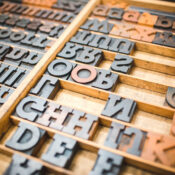Senior managing editor and logophile Andy Hollandbeck reveals the sometimes surprising roots of common English words and phrases. Remember: Etymology tells us where a word comes from, but not what it means today.
Across the country today, towns and cities are marking Independence Day with joyous red-white-and-blue parades. While parade conjures images of marching bands, floats, and candy thrown from slow-moving vehicles, the word took a while getting to that point.
Parade traces back to the Latin verb parare, which means “to arrange, to make ready, to adorn.” In a noun form, this evolved through the Romance languages in a few different ways. For example, the Italian parate “a defending, a garish setting forth” and the Spanish parada “a stopping.” Parare found its way into English in a number of ways, too. A more common way to say “make ready” is prepare, which comes from the same root and is related to pare, repair, apparatus, and parry, all etymological cousins of parade.
Parade wound its way into French, too, as a military term meaning “a halt on horseback” by the 15th century, which led to the broader idea of a “military display.” Now, there are two primary reasons for military personnel to put themselves on display, and by the mid-17th century, English had adopted both of them: The first is so that the troops may be inspected by the officers. The second communicates something to rivals — it’s a show of force.
Outside the military, this second sense of parade became “a show of bravado, a pompous show.” Most early English uses of parade focus on that pomposity rather than anything celebratory. Take, for example, this 1761 translation from Charles Batteux’s A Course of the Belles Lettres:
But what great cause of pride is there, pray now, in being the thousandth in a direct line from some old Tuscan stock, or in calling a censor cousin? — Go, make a parade of your trumpery to the gaping mob; as for me, I know you to the bottom.
The French senses took the same turn; today, public or military parades are more usually called défilés, and the verb parader means “to show off.”
But in the late 1700s, we also start to see (in English) a sense of parade meaning “a series of people or things appearing one after the other” — though not necessarily in a celebratory way. Funeral parades were not uncommon. The sense of the English word parade as a public, celebratory procession really began to solidify in the late 1800s; shortly thereafter it also took on a verbal meaning, so that now we can parade through town to celebrate Independence Day.
Become a Saturday Evening Post member and enjoy unlimited access. Subscribe now




Comments
Great back story here of the long, circuitous route ‘parade’ has passed through (Latin, Italian and French) to get to the basically modern meaning we’ve had of the word since the late 19th century. I hadn’t realized it had origins in the pompous, rather than good time celebrations throughout the nation, starting with the Rose Parade on January 1st, then in the more familiar individual parades in towns coast to coast usually starting around Memorial Day.